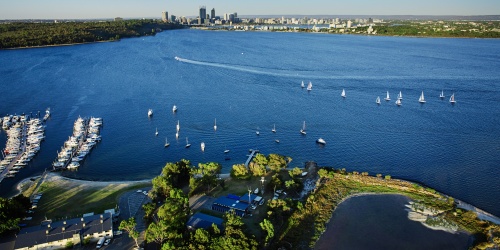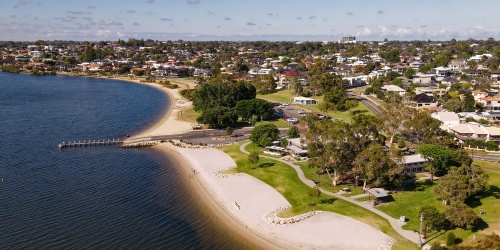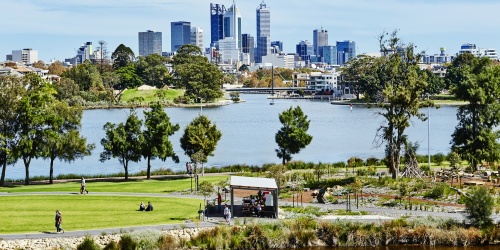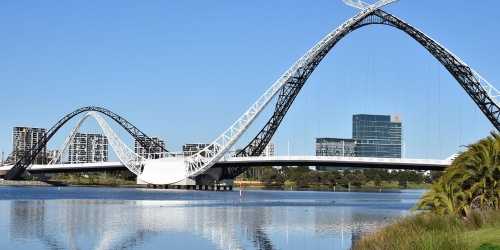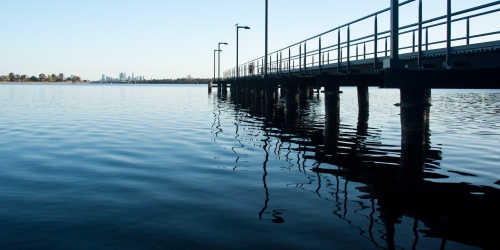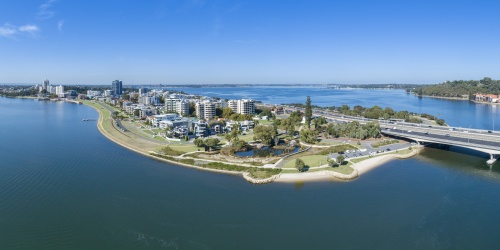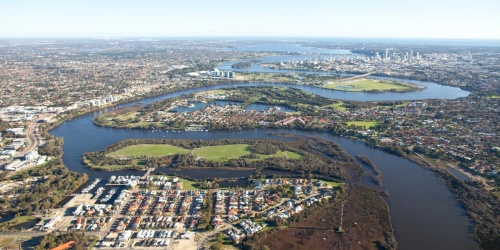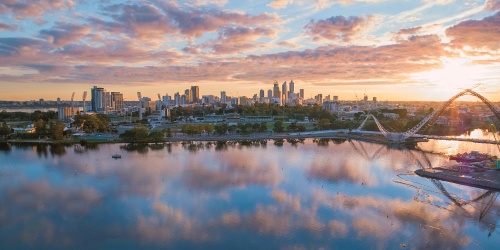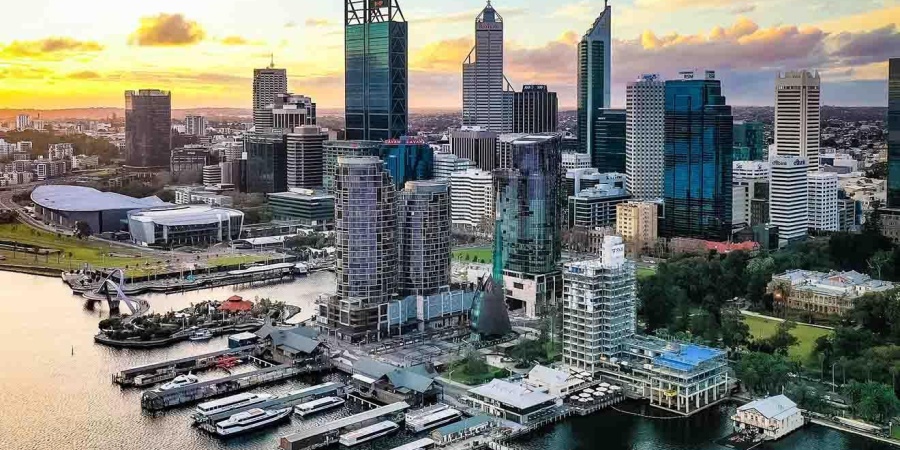
Perth city. Photo by Tom Proudfoot
This page explains how to lodge a permit application to undertake commercial activities in the Swan Canning Development Control Area (DCA).
Permits allow commercial activities to be assessed, authorised, managed and monitored to ensure the protection and long-term enjoyment of the Swan and Canning rivers.
Commercial activities permit and assessment pathway
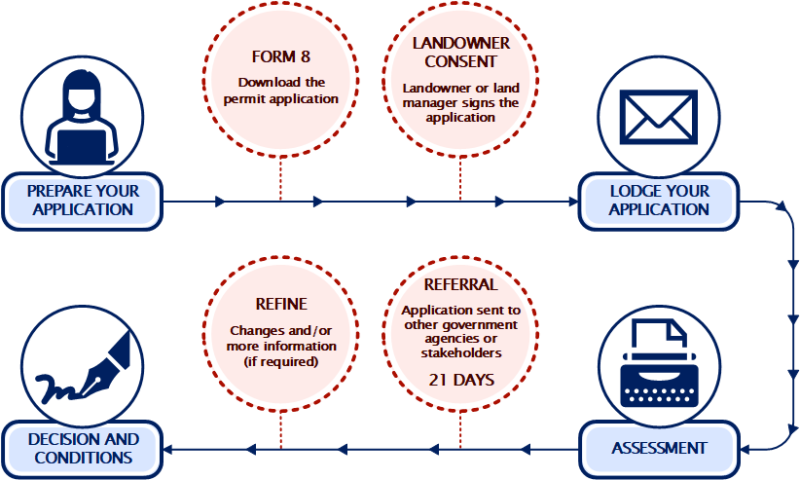
Commercial activities permit application and assessment process.
The figure above outlines the permit application and assessment pathway:
PREPARE YOUR APPLICATION
- Download the Form 8 Commercial activities permit application form (available below) and review DBCA’s Policy 46 before completing your application.
- Ensure that the landowner or land manager has signed the application form or a letter of support has been provided. For public land around the River reserve, the local government is usually the land manager. DBCA will arrange landowner consent for the River reserve or CALM Act land such as National Parks, Regional Parks, Matilda Bay, etc.
LODGE YOUR APPLICATION
- Email your completed form and any supporting documents to rivers.planning@dbca.wa.gov.au.
- DBCA will review your application to ensure it is valid. You may be asked to provide more information or to amend your application.
ASSESSMENT
- Your application may be referred to other government agencies or stakeholders for comment and recommended conditions. They are given 21 days to respond.
- Your application will be assessed against DBCA policies, plans and guidelines as well as advice received from referrals. You may be asked to provide more information or to amend your application.
DECISION AND CONDITIONS
- You will be notified in writing of the assessment decision. If approved, the approval may be issued with conditions. If refused, the notification will state the reason for this decision.
- You must adhere to the conditions of your approval while operating in the Swan Canning Riverpark. Failure to do so may result in a fine, or suspension or revocation of your approval.
If you would like more information about submitting an application to DBCA or you’re not sure what kind of approval you need, chat to us. Give us an idea about what you’re proposing, and we can let you know what kind of approval you’ll need and help you with your application. Be sure to also check out DBCA’s policies, plans and guidelines manual as your proposal will be assessed against these to ensure it complies. Otherwise, jump to the How to apply section below.
Swan Canning Commercial Activities Handbook
We have recently developed a Swan Canning Commercial Activities Handbook as a reference and guide for commercial operators who have received a Commercial Activities Permit or those who are looking to apply.
Inside the handbook you will find:
- guidance on how to read and understand a commercial activities permit
- background information and a map to help you navigate the Swan Canning Riverpark,
- safety information for commercial operators in the Swan Canning Riverpark,
- a list of all general conditions used on Commercial Activities Permits,
- a copy of the Commercial Charter Vessel Code of Conduct (charter vessel activities should be conducted in accordance with this Code), and
- other additional information and reference material that supports the general conditions of a Commercial Activities Permit.
New applicants are encouraged to read through the handbook to get an understanding of what to expect, including conditions you will be required to adhere to, when operating in the Swan Canning Riverpark.
We also welcome any feedback you may have on the handbook. Please let us know if the information has been useful or any changes or additions you’d like to see in future. Please send any feedback via email to rivers.planning@dbca.wa.gov.au with the subject: Feedback: Swan Canning Commercial Activities Handbook.
Who needs to apply?
All commercial activities in the DCA require a permit from the Department of Biodiversity, Conservation and Attractions (DBCA).
Anyone wishing to undertake a commercial activity within the Swan Canning DCA requires an approval.
Some examples of commercial activities that require approval include:
- charters and tours
- adventure activities
- hire and drive vessels
- instruction/lessons
- firework displays
- food vending
The DCA includes the waters of the Swan and Canning rivers and adjoining parks and recreation reserves, including privately owned land reserved for parks and recreation.
More information on the DCA, including how to find out if your property is affected by the DCA, is available on the Swan Canning Development Control Area page.
Where development of infrastructure is required on land or water to support the commercial operation (e.g. construction of a ticket booth), a part 5 development approval may also be required. See the Making an application for development page for more information.
How to apply
Complete the Form 8 Commercial Activities Permit Application (available for download below) and submit your application.
Form 8 includes application guidelines (in the first two pages of the form) with application submission instructions and a checklist to ensure all information required to make an assessment of the activity proposed is submitted with the application.
Corporate Policy 46 – Planning for commercial operations in the Swan Canning Development Control Area provides guidance regarding DBCA’s position on commercial facilities and operations in the DCA. This policy is available for download on the Policies, plans and guidelines manual page. This page also includes other policies relevant to development in the Swan Canning DCA. Please note that DBCA may require modifications to your proposal to address environmental or amenity factors, community values, shared use, and safety considerations.
Please contact us if you would like assistance with your application or to discuss your proposal further. We can also help let you know which policies would be most relevant to the assessment of your proposal.
Renewing an existing approval for a commercial activity
To renew an existing approval for commercial activities in the DCA, simply complete and submit the Form 8 Commercial Activities Permit Application (available for download below).
Renewals are generally processed much faster than new applications.
When receiving an approval, please make note of the expiry date and allow enough time for the application for renewal to be processed so that the approval does not lapse. Penalties may apply for operating in the DCA without an approval.
How long does it take to assess an application?
Permit applications for standard charter vessel operations can be processed and approved within 28 days (often sooner) once all relevant information has been received.
Other commercial activity applications may require referrals to other agencies such as the Department of Transport – Marine Safety and/or the relevant local government and can take up to 42 days to process once all relevant information has been received.
New commercial activities proposed in the DCA or complex applications may require a higher level of assessment and application processing times may be extended.
Proposals that require development of infrastructure in the DCA may require Ministerial approval under Part 5 of the Swan and Canning Rivers Management Act 2006. DBCA can advise on the timeframe for Part 5 applications depending on the nature of the proposal. More information on the process for obtaining a Part 5 development approval is provided on the Making an application for development page.
Penalties and infringements
Anyone who undertakes works, acts or activities within the DCA without a permit may be issued an infringement notice and fined $5,000.
The following activities are generally not permitted within the DCA and can incur a fine of $5,000:
- Leaving a vessel unattended for 8 hours or more outside of a vessel storage facility.
- Launching a vessel directly from a trailer into the river (vessels must be launched from a designated boat ramp).
- Using a vessel as accommodation.
- Using a courtesy mooring for more than four (4) hours in a six (6) hour period.
- Using a courtesy mooring for a vessel larger than what is permitted on the courtesy mooring sign.
- Littering.
If you have any questions in relation to the above, please contact us at rivers.planning@dbca.wa.gov.au.
Suspensions and revocations
A permit may be suspended or revoked if:
- The works or activity, if continued, would have an adverse impact on the ecological and community benefits and amenity of the Swan Canning Riverpark.
- A breach of condition or restriction stated on the permit.
- False or misleading information included in the application.
You will either:
- Receive a Notice of Proposed Revocation or Notice of Proposed Suspension. OR
- Receive a Notice of Interim Suspension along with a Notice of Proposed Revocation or Notice of Proposed Suspension. This notice will suspend your permit immediately and all works or activities must cease.
You will be given time to provide a response to the notice before any action is taken by DBCA.
DBCA will consider your response before deciding on the outcome of the suspension or revocation notice. Possible outcomes are:
- DBCA may lift the Interim Suspension and take no further action.
- The suspension or revocation of your permit will not be actioned.
- Your existing permit may be revoked, and a replacement permit issued.
- Your permit may be suspended for a set period and the activity must cease until that time expires or you are advised by DBCA.
- Your permit may be revoked, and no replacement issued. If this occurs, you may apply for another permit, but the works or activity will need to be modified.
Frequently asked questions about commercial activity approvals
Why do I need a permit to operate my commercial activity in the Swan Canning Riverpark?
Permits allow tourism activities to be assessed, authorised, managed and monitored. These permits have conditions or terms that must be met by businesses operating in the Swan Canning Riverpark and are designed to ensure that commercial activities complement the Riverpark and do not negatively impact on the environment, amenity, community values and shared use of the area. Safety also needs to be considered. All commercial activities in the DCA require a permit.
Which agency grants permits and leases for the Swan and Canning rivers?
The Department of Biodiversity, Conservation and Attractions (DBCA) is the State Government agency that has planning, protection and management responsibilities for the Swan and Canning rivers and associated land, collectively known as the Swan Canning Development Control Area.
Are there any other approvals I may need from DBCA for my commercial activity in the Swan Canning Riverpark?
If development of infrastructure is required to support a commercial activity, a Ministerial approval under Part 5 of the Swan and Canning Rivers Management Act 2006 may be required.
Riverbed leases are used to authorise activities that require the exclusive use of a site in the river to support the business operations, such as commercial jetties or overwater restaurants. New leases granted over the River reserve must be consistent with a Part 5 development approval for the supporting infrastructure. Commercial rates are charged for the lease.
Long term use of land in the Swan Canning Riverpark may require approval and a licence or lease from the relevant land manager. This is usually the local government authority.
Other licences or certificates from government agencies may also be required for your commercial operation such as a jetty licence, liquor licence, a Certificate of Survey or trading permit.
For more information contact DBCA's Swan Canning Waterways Branch, Statutory Assessments Unit, on 9219 9000 or at rivers.planning@dbca.wa.gov.au.
If I have a T-Class licence issued under the Conservation and Land Management Act (CALM Act) for activities in the Swan Estuary Marine Park, do I still need a permit under the Swan and Canning Rivers Management Act 2006 (SCRM Act)?
Regulation 17(2)(b) of the Swan and Canning Rivers Management Regulations 2007 states a permit is not required if the commercial act or activity is undertaken in accordance with a licence issued under section 94 of the CALM Act. Note, this applies if the approved commercial activity occurs within the Swan Estuary Marine Park only.
The Swan Estuary Marine Park encompasses:
- Alfred Cove, 200 hectares adjacent to the suburbs of Attadale and Applecross;
- Pelican Point, a 45 hectare area in Crawley; and
- Milyu, 95 hectares adjacent to the Como foreshore.
For example, if a stand-up paddle board operator is only operating in a CALM Act Marine Park and has an approval under the CALM Act to do so, a SCRM Act permit would not be required. If a stand-up paddle board operator also wanted to operate from other locations in the Swan Canning Riverpark, outside of the marine park, a permit under the SCRM Act would also be required.
Why do I have to apply through a competitive process for some permits and leases?
A competitive process may apply to the grant of some permits and leases. This is the fairest way to grant the permit or lease opportunity to the most competitive applicant and to ensure the best outcomes are obtained for the community through a transparent process.
A competitive process may apply to the grant of permits that are restricted in number or for riverbed leases. For example, a competitive process was run for the commercial operation of seaplanes on Perth Waters to select the most suitable operator.
If you have questions about whether a competitive process may apply to your proposal, please contact DBCA Swan Canning Waterways Branch, Statutory Assessments Unit, on 9219 9000 or at rivers.planning@dbca.wa.gov.au.
Still have questions?
Refer to the Frequently Asked Questions page for more information. This page includes information about application fees, landowner consent, referral agencies, etc.
